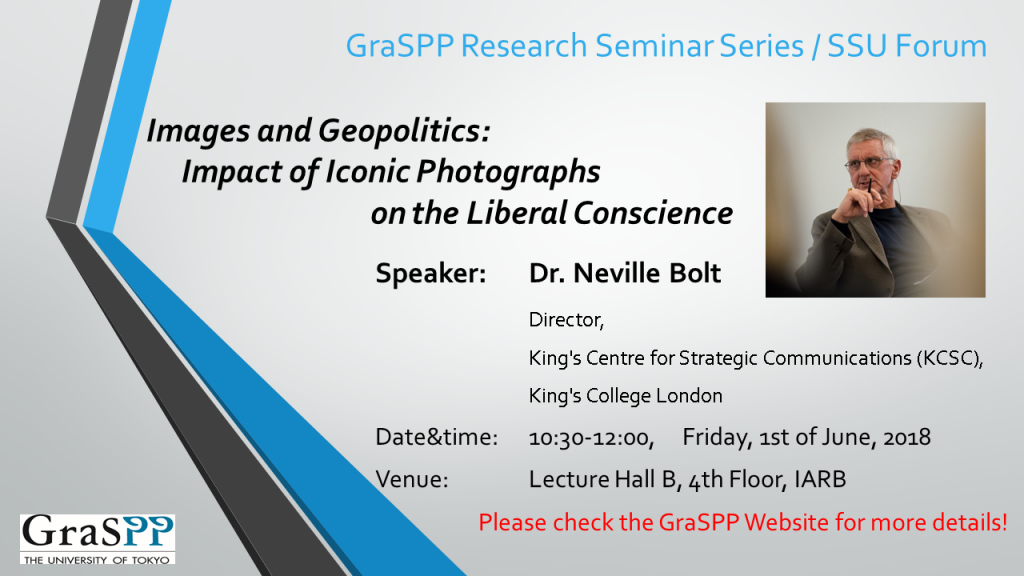GraSPP Research Seminar
| Speaker : | Dr. Neville Bolt Director, King’s Centre for Strategic Communications (KCSC), King’s College London |
| Chair/commentator : | Prof. Chiyuki Aoi, Graduate School of Public Policy |
| Date : | Friday, 1st of June, 2018 |
| Time : | 10:30-12:00 |
| Venue : | Lecture Hall B, 4th Floor, International Academic Research Bldg. (map) |
| Organizer : | GraSPP Research Seminar, Graduate School of Public Policy SSU Forum, Policy Alternative Research Institute |
For the participation, please register from here
《Abstract》
Millions of images circulate each day in the global mediaspace that connects social media to more traditional outlets like television and the press.
Occasionally some acquire iconic status linking the local event to higher moral, perhaps universal sensitivities. Particular images have come to represent the way terror events are understood in the popular imagination. But are they not misleading? Do other, less performative images not point to a more subtle subversion? These reach into the very heart of geopolitics and threaten the liberal conscience.
《Dr. Neville Bolt’s biography》
Dr. Neville Bolt is the Director of the King’s Centre for Strategic Communications (KCSC), a leading global centre of expertise in strategic communications.
He is Editor-in-Chief of Defence Strategic Communications, the peer reviewed academic journal of NATO Strategic Communications Centre of Excellence.
Bolt is convenor of the Masters programme in Strategic Communications in the Department of War Studies, King’s College London. He lectures on the Masters course Evolution of Insurgency and Counterinsurgency. And he teaches the International Relations course Transnational Movements, Networks and Revolutionary Strategy. He is supervisor to PhD students researching topics including empathy in international negotiations; trust in the revolutionary theatre; counter-conduct & democratic dissent; materiality of communication in urban space; metaphors of containment in the Cold War. He was the Teaching Excellence Award Winner 2017.
Much of his career was spent as a television journalist and producer-director at the BBC,ITV, and CBC (Canada). Working in news and current affairs, he specialised in the production of war zone documentaries covering conflicts in Africa, Latin America, the Middle East, and Indian subcontinent. Later he created strategic communications campaigns with the British Labour Party, Amnesty International, and the African National Congress (ANC)/Anti-Apartheid Movement.
His book The Violent Image: Insurgent Propaganda and the New Revolutionaries (Columbia University Press) received the CHOICE ‘outstanding academic status award’ 2013. He iscurrently writing two books: The Future Came Too Soon – State and Insurgency in the Digital Age; and Unmapping the 21st Century
Millions of images circulate each day in the global mediaspace that connects social media to more traditional outlets like television and the press.
Occasionally some acquire iconic status linking the local event to higher moral, perhaps universal sensitivities. Particular images have come to represent the way terror events are understood in the popular imagination. But are they not misleading? Do other, less performative images not point to a more subtle subversion? These reach into the very heart of geopolitics and threaten the liberal conscience.
《Dr. Neville Bolt’s biography》
Dr. Neville Bolt is the Director of the King’s Centre for Strategic Communications (KCSC), a leading global centre of expertise in strategic communications.
He is Editor-in-Chief of Defence Strategic Communications, the peer reviewed academic journal of NATO Strategic Communications Centre of Excellence.
Bolt is convenor of the Masters programme in Strategic Communications in the Department of War Studies, King’s College London. He lectures on the Masters course Evolution of Insurgency and Counterinsurgency. And he teaches the International Relations course Transnational Movements, Networks and Revolutionary Strategy. He is supervisor to PhD students researching topics including empathy in international negotiations; trust in the revolutionary theatre; counter-conduct & democratic dissent; materiality of communication in urban space; metaphors of containment in the Cold War. He was the Teaching Excellence Award Winner 2017.
Much of his career was spent as a television journalist and producer-director at the BBC,ITV, and CBC (Canada). Working in news and current affairs, he specialised in the production of war zone documentaries covering conflicts in Africa, Latin America, the Middle East, and Indian subcontinent. Later he created strategic communications campaigns with the British Labour Party, Amnesty International, and the African National Congress (ANC)/Anti-Apartheid Movement.
His book The Violent Image: Insurgent Propaganda and the New Revolutionaries (Columbia University Press) received the CHOICE ‘outstanding academic status award’ 2013. He iscurrently writing two books: The Future Came Too Soon – State and Insurgency in the Digital Age; and Unmapping the 21st Century


